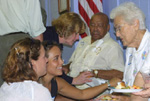Students leave classrooms to learn from senior mentors
by Dick PetersonPublic Relations
Classroom walls at MUSC are coming down.
Evidence of that can be seen beginning Sept. 16 when 24 medical students and six physician assistant students leave campus for two hours to learn from their “senior mentors” at the Canterbury House retirement apartments on Market Street.
 Second-year
medical students get to know their senior mentor at the reception to kick
off the new student pilot program at the Canterbury House.
Second-year
medical students get to know their senior mentor at the reception to kick
off the new student pilot program at the Canterbury House.
“It’s a pilot program to introduce students to the special health care needs of the elderly,” said David Garr, M.D., the College of Medicine’s associate dean for community medicine. In a population where health care needs change with demographics, medical education must respond. Garr lists geriatric medicine, health care disparities and the needs of children and youth as the three areas requiring increased attention in the coming years.
In their first year, medical students leave their classrooms for doctors’ offices to learn patient interview skills. And in their second, they and some of their faculty will visit patients where they live.
“In my opinion, students are most likely to learn what they see as being most relevant, and the best way to do that is in a setting where the information is put to use,” Garr said.
The program, which was designed in collaboration with the university’s Center on Aging, matches students with pre-designated senior mentors who will serve as subjects for the physical diagnosis course and guide the students through the special issues that will help prepare them to provide care to the elderly.
The visits to Canterbury House will occur monthly through April.
During their first visit in September, the students will be guided by a detailed syllabus of select reading materials and will ask questions of their senior mentors that amount to a “life review,” an approach that helps seniors reminisce about events and circumstances that have shaped who they are and what they have become.
“The questions will encourage the senior mentors to talk about life, what it was like growing up, the events that made them who they are today. During their visits in October and November, the students will obtain a complete medical history and perform a functional assessment,” Garr said.
Novel to the program is the planned close association between the students and faculty and students from other MUSC colleges. Garr cited the inclusion of College of Dental Medicine faculty and students who will teach about oral health and supervise oral exams.
“Nutrition is a major concern as oral health deteriorates. With missing teeth, people often fail to eat properly.” He said that dietetic students from the College of Medicine will also join the medical and physician assistant students in assessing their senior mentors’ nutritional health. They will take a diet history, and in some cases request permission to check their refrigerators for the sort of food they have on hand and advise them about healthy eating.” Garr said that elderly people sometimes can’t afford the foods they need, or make poor choices based on what they can afford or what they like instead of what they need to stay healthy.
Also joining the students in the community will be faculty from the College of Pharmacy concerned with pharmacotherapy in the elderly, and social workers concerned with access to medical services for the elderly, their ability to pay for care and support systems in the community. Mental health and end-of-life care are other issues to be covered.
MUSC’s emphasis on elder care is not unusual among medical schools, Garr said, but his college’s plan to send students and faculty into the community is. “We learn so much more when we visit geriatric patients where they live,” Garr said. “People older than 85 years old have different needs when compared with people who are 55. They metabolize medicines differently and their health needs are different. The caregiver unaware of these special needs can overlook important things, and that can lead to poor health outcomes.”
Garr said that increasingly, the team approach to health care is becoming standard health care practice. “It’s a much more efficient way to deliver service,” he said, “and we at MUSC want to teach our students to work with other health care professionals and understand what they can contribute to patient care.”
“And this is quite unique,” Garr said, “that College of Medicine faculty will go out into the community with their students. The logistics—parking, time away from campus—may be daunting, but my hope is that the benefits of this geriatric education program will far outweigh the logistical challenges.”
Catalyst Online is published weekly, updated as
needed and improved from time to time by the MUSC Office of Public Relations
for the faculty, employees and students of the Medical University of South
Carolina. Catalyst Online editor, Kim Draughn, can be reached at 792-4107
or by email, catalyst@musc.edu. Editorial copy can be submitted to Catalyst
Online and to The Catalyst in print by fax, 792-6723, or by email to petersnd@musc.edu
or catalyst@musc.edu. To place an ad in The Catalyst hardcopy, call Community
Press at 849-1778.